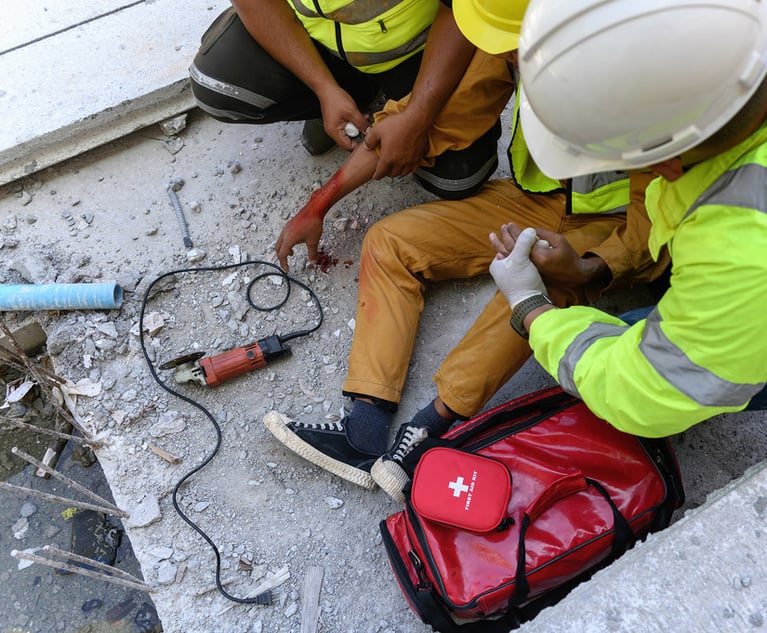Communications With Successor Counsel Held Not Privileged in Legal Malpractice Case
The Appellate Division said letters and emails between Lane Construction of Denville and its successor counsel in the underlying action were not subject to attorney-client privilege in the legal malpractice suit against New Jersey-based firms Lowenstein Sandler and MARC Law.
March 05, 2020 at 03:51 PM
7 minute read
 Photo: Shutterstock
Photo: Shutterstock
In a general contractor's legal malpractice case against two law firms that advised it in a construction contract dispute, an Appellate Division panel said the contractor must produce discovery related to its communications with counsel hired to replace the firms it is now suing.
In Lane Construction v. Munday, the panel on Tuesday said the exchange of letters and emails between Lane Construction of Denville and its successor counsel in the underlying action was integral to the case and not subject to attorney-client privilege in the legal malpractice suit against New Jersey-based firms Lowenstein Sandler and MARC Law.
"First … the attorney client privilege does not extend 'to a communication relevant to an issue of breach of duty by the lawyer to his client, or by the client to his lawyer,'" the panel said in the per curiam decision, affirming a decision compelling disclosure from the Morris County Superior Court. "The communications at issue are clearly relevant to the alleged breach of such a duty by defendants. … Second, plaintiff placed the disputed discovery directly at issue when it sued its predecessor counsel for malpractice."
The panel of Appellate Division Judges Jack Sabatino, Thomas Sumners and Arnold Natali Jr. also said the documents and related discovery at issue "are clearly necessary for defendants to defend properly against plaintiff's claims that they breached a standard of care that proximately and fully caused plaintiff's damages."
"On remand plaintiff shall produce a privilege log identifying all disputed privileged communications," said the opinion. "The trial court should then conduct an in-camera review of those materials and make specific rulings consistent with the legal principles detailed in our opinion."
The successor counsel for Lane Construction is Trautmann & Associates in Denville and Mineola, New York, firm Levitt.
In addition to Lowenstein and MARC, the malpractice action also names William Munday, who moved from Lowenstein to MARC during his representation of Lane Construction, and Bruce Rosen of MARC, who also represented Lane in the underlying matter.
Gregg D. Trautmann of Trautmann & Associates represents Lane Construction in the appeal.
Reached by phone, he said the plaintiffs are "certainly going to seek certification" to the state Supreme Court. "While I respect the Appellate Division decision, I think it will have an enormous chilling effect on attorneys' willingness to step in underlying cases and represent litigants" and could open "floodgates to a brand new area of discovery that heretofore did not exist," he said.
He added that, given the decision, "In a case like this, where original attorneys show up at the client's offices and say they made a mistake and possibly committed malpractice and suggest that the client should retain new counsel, that [new] attorney would be foolish to step in."
Daniel Albert Malet of McElroy, Deutsch, Mulvaney & Carpenter in Newark represented Rosen and MARC. He sent a statement: "We are pleased with this victory before the Appellate Division, upholding the trial judge's decision that compels the production of documents, communications and testimony."
He added: "The allegations are meritless, and we look forward to having that proven on remand."
David Morgan Blackwell of Donnelly Minter & Kelly in Morristown represents Munday. Blackwell sent an email on Thursday: "We are pleased with the outcome and applaud the court's well-reasoned decision. We look forward to establishing a full, fair, and accurate record on which to base our defenses on remand."
Philip Touitou at Akerman in New York represented Lowenstein Sandler. Touitou also could not be reached for comment.
According to the decision, Lane Construction contracted with the Great Atlantic and Pacific Tea Co. (A&P) to perform construction and renovation work at a supermarket in New York for a base contract price of $5.74 million. A&P, Lane alleged, authorized another $1.12 million in work and refused to pay for the additional costs. Lane retained Munday, then a partner at Lowenstein, to prepare and file a mechanic's lien on the property. Munday then left Lowenstein and became an associate at MARC, where he continued to represent Lane.
Rosen, assisting Munday, filed an extension of the mechanic's lien and an arbitration demand and after A&P filed for Chapter 11 bankruptcy also filed a mechanic's lien foreclosure complaint in New York state court against the landowners. A New York court entered an order extending Lane's mechanic's lien for one year but Rosen failed to extend the mechanic's lien the following year, according to the decision.
After A&P's bankruptcy plan was confirmed, Lane Construction won an arbitration award of $308,738. A&P later filed a second bankruptcy petition a year later, but Lane claims in its suit that its lawyers failed to file a notice of claim in that action. Three days after its second bankruptcy filing, A&P intervened in the New York foreclosure action and filed a counterclaim against Lane.
Rosen and Munday on April 12, 2016, informed Lane that they allowed the mechanic's lien to expire, rendering the $308,738 arbitration award uncollectable. They advised Lane to retain separate counsel regarding a possible malpractice claim.
Lane terminated MARC, Munday and Rosen the next month, and Levitt and Trautmann were retained as new counsel for Lane.
In a settlement, Lane paid A&P $90,000 to withdraw its counterclaim in New York.
Lane's malpractice action against Munday, Rosen, MARC and Lowenstein claims that the lawyers misrepresented their ability to litigate construction contract disputes and their experience with mechanic's liens, among other shortcomings.
In discovery, Lane cited several documents and emails pertaining to the A&P settlement and an August 2016 check from Trautmann to Levitt. The defendants filed a motion to compel Lane to produce all such communications, though Lane said it had provided all responsive and non-privileged discovery.
A trial court granted the motion to compel, concluding that the attorney-client privilege did not preclude discovery of communications between Lane and its successor counsel, and ordered Lane, Trautmann, and Levitt to produce all such documents relating to litigation with the landowner and A&P.
In its affirmance Tuesday, the Appellate Division said it relied in part on the state Supreme Court's three-pronged Kozlov analysis for piercing the attorney-client privilege: "a legitimate need … to reach the evidence sought to be shielded"; (2) evidence that is relevant and material; and (3) a finding that the information sought cannot be obtained from a less intrusive source.
The panel said the attorney-client privilege does not apply to communications "relevant to an issue of breach of duty by the lawyer to his client, or by the client to his lawyer."
The panel said Lane "implicitly waived the attorney-client privilege by placing at issue in the malpractice action the legal advice Trautmann and Levitt as superseding counsel provided to them, as that advice is directly relevant to the cause of plaintiff's alleged damages."
"Refusing to pierce the attorney-client privilege in this case would severely handicap defendants' constitutional right to a fair trial," and the defendants "would be severely and impermissibly curtailed in establishing their claim that plaintiff entered into a detrimental settlement agreement due to the alleged negligence of its successor counsel," said the court.
For the case to be fairly tried, the trial court reasoned correctly, said the panel.
"Defendants should not be forced to accept such assertions without an ability to challenge those claims or explore action, as noted, the discovery is relevant as it directly addresses the proximate cause and damages issues."
The panel also affirmed an order for Lane Construction principals to be re-deposed.
This content has been archived. It is available through our partners, LexisNexis® and Bloomberg Law.
To view this content, please continue to their sites.
Not a Lexis Subscriber?
Subscribe Now
Not a Bloomberg Law Subscriber?
Subscribe Now
NOT FOR REPRINT
© 2025 ALM Global, LLC, All Rights Reserved. Request academic re-use from www.copyright.com. All other uses, submit a request to [email protected]. For more information visit Asset & Logo Licensing.
You Might Like
View All

Dispute Resolution Boards—Getting Real Time Decisions on Construction Projects
7 minute read
Insurer Has No Duty to Defend 'Laidlow' Claims, NJ Supreme Court Says
3 minute read
Construction Worker Hit by Falling Concrete Settles Claims for $2.3M
4 minute readLaw Firms Mentioned
Trending Stories
- 1South Florida Attorney Charged With Aggravated Battery After Incident in Prime Rib Line
- 2'A Death Sentence for TikTok'?: Litigators and Experts Weigh Impact of Potential Ban on Creators and Data Privacy
- 3Bribery Case Against Former Lt. Gov. Brian Benjamin Is Dropped
- 4‘Extremely Disturbing’: AI Firms Face Class Action by ‘Taskers’ Exposed to Traumatic Content
- 5State Appeals Court Revives BraunHagey Lawsuit Alleging $4.2M Unlawful Wire to China
Who Got The Work
J. Brugh Lower of Gibbons has entered an appearance for industrial equipment supplier Devco Corporation in a pending trademark infringement lawsuit. The suit, accusing the defendant of selling knock-off Graco products, was filed Dec. 18 in New Jersey District Court by Rivkin Radler on behalf of Graco Inc. and Graco Minnesota. The case, assigned to U.S. District Judge Zahid N. Quraishi, is 3:24-cv-11294, Graco Inc. et al v. Devco Corporation.
Who Got The Work
Rebecca Maller-Stein and Kent A. Yalowitz of Arnold & Porter Kaye Scholer have entered their appearances for Hanaco Venture Capital and its executives, Lior Prosor and David Frankel, in a pending securities lawsuit. The action, filed on Dec. 24 in New York Southern District Court by Zell, Aron & Co. on behalf of Goldeneye Advisors, accuses the defendants of negligently and fraudulently managing the plaintiff's $1 million investment. The case, assigned to U.S. District Judge Vernon S. Broderick, is 1:24-cv-09918, Goldeneye Advisors, LLC v. Hanaco Venture Capital, Ltd. et al.
Who Got The Work
Attorneys from A&O Shearman has stepped in as defense counsel for Toronto-Dominion Bank and other defendants in a pending securities class action. The suit, filed Dec. 11 in New York Southern District Court by Bleichmar Fonti & Auld, accuses the defendants of concealing the bank's 'pervasive' deficiencies in regards to its compliance with the Bank Secrecy Act and the quality of its anti-money laundering controls. The case, assigned to U.S. District Judge Arun Subramanian, is 1:24-cv-09445, Gonzalez v. The Toronto-Dominion Bank et al.
Who Got The Work
Crown Castle International, a Pennsylvania company providing shared communications infrastructure, has turned to Luke D. Wolf of Gordon Rees Scully Mansukhani to fend off a pending breach-of-contract lawsuit. The court action, filed Nov. 25 in Michigan Eastern District Court by Hooper Hathaway PC on behalf of The Town Residences LLC, accuses Crown Castle of failing to transfer approximately $30,000 in utility payments from T-Mobile in breach of a roof-top lease and assignment agreement. The case, assigned to U.S. District Judge Susan K. Declercq, is 2:24-cv-13131, The Town Residences LLC v. T-Mobile US, Inc. et al.
Who Got The Work
Wilfred P. Coronato and Daniel M. Schwartz of McCarter & English have stepped in as defense counsel to Electrolux Home Products Inc. in a pending product liability lawsuit. The court action, filed Nov. 26 in New York Eastern District Court by Poulos Lopiccolo PC and Nagel Rice LLP on behalf of David Stern, alleges that the defendant's refrigerators’ drawers and shelving repeatedly break and fall apart within months after purchase. The case, assigned to U.S. District Judge Joan M. Azrack, is 2:24-cv-08204, Stern v. Electrolux Home Products, Inc.
Featured Firms
Law Offices of Gary Martin Hays & Associates, P.C.
(470) 294-1674
Law Offices of Mark E. Salomone
(857) 444-6468
Smith & Hassler
(713) 739-1250






